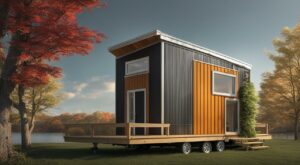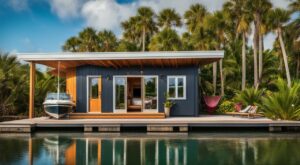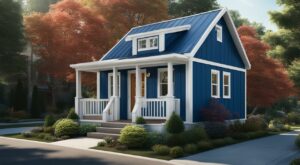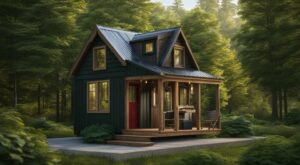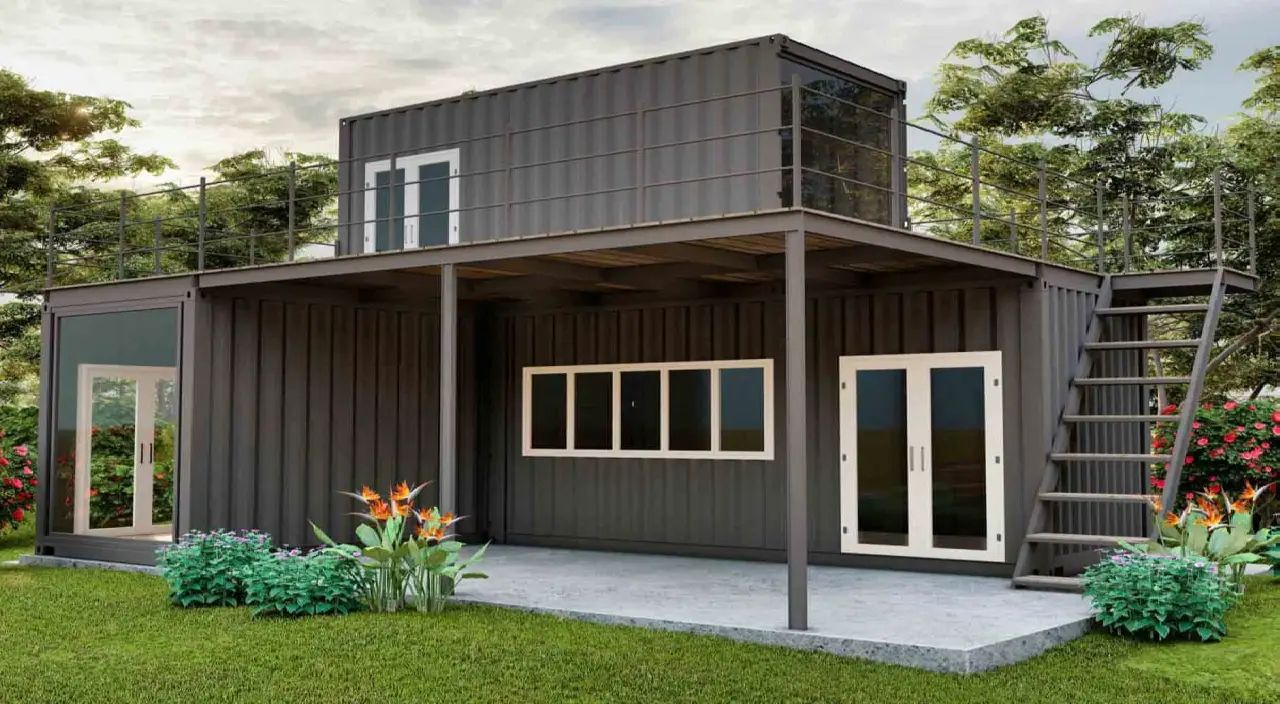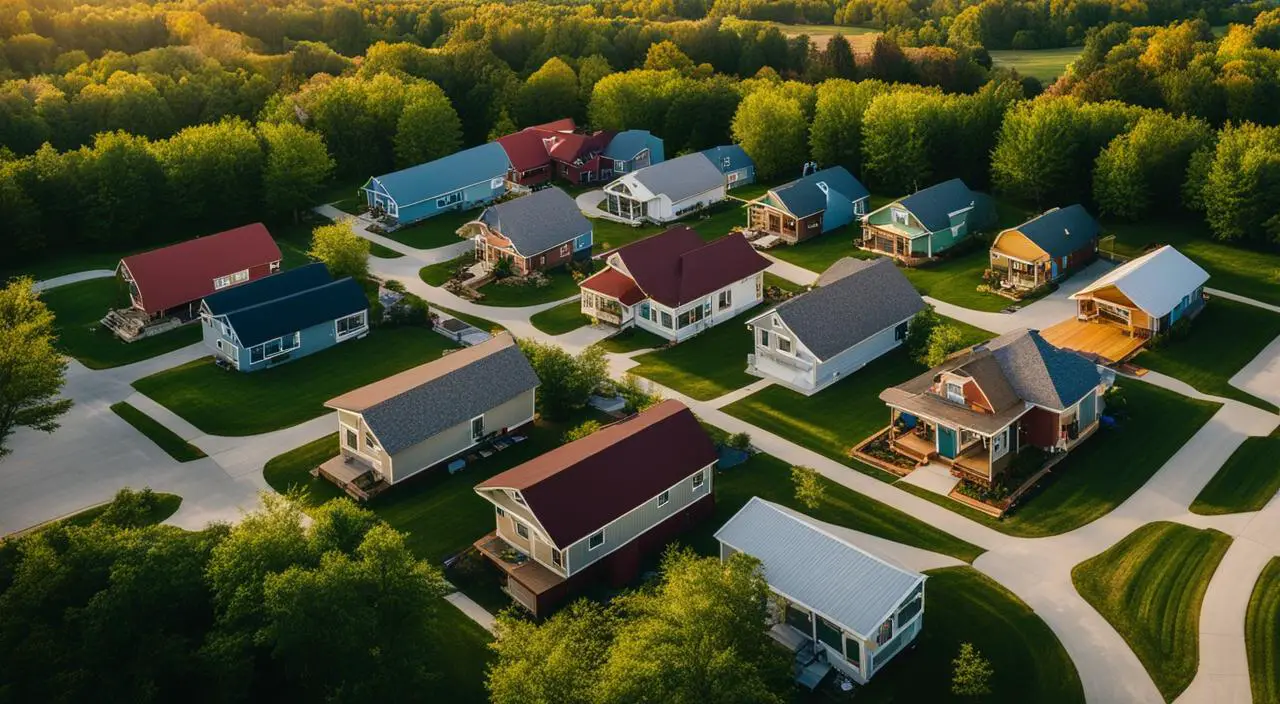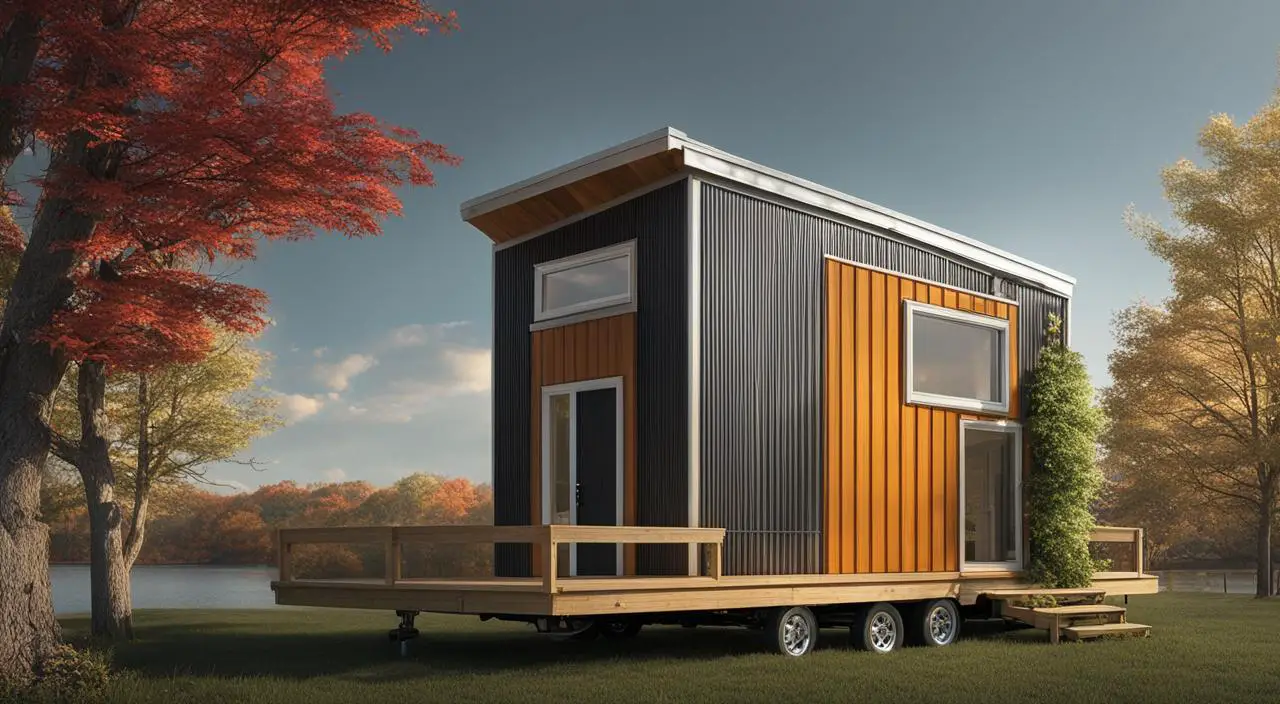Your cart is currently empty!
Tiny House Laws New Hampshire: A Complete Guide

Affiliate Disclaimer: This post may contain affiliate link or links
Tiny house laws New Hampshire: Living in a tiny house can be a unique and rewarding experience, but it’s crucial to understand the legalities and regulations associated with it.
New Hampshire has specific laws and regulations when it comes to tiny houses, and it’s essential to know what they are before you start building or living in one.
Contents
This article will provide a comprehensive guide to understanding and navigating the tiny house laws in New Hampshire, covering building laws, zoning regulations, permits, inspections, and more.
Understanding New Hampshire’s Building Laws and Zoning Regulations
Living in a tiny house can be an appealing lifestyle choice, but it is essential to understand the legal requirements and regulations associated with it.
In New Hampshire, several building laws and zoning regulations must be adhered to when constructing and living in a tiny house.
The International Building Code (IBC) is a comprehensive set of building standards that many states, including New Hampshire, have adopted.
The version currently in use in New Hampshire is the 2015 edition of the IBC. The IBC has specific requirements for different types of structures, including tiny houses.
| Relevant Bill/Amendment | Description |
|---|---|
| HB 588 | This bill added Appendix Q to the 2015 International Residential Code, which provides standards for tiny houses on a foundation. |
| RSA 674 | This statute provides for municipal regulation of land use by zoning ordinances. It allows for different zones to have different regulations, including size and type of structures. |
Appendix Q is a separate document in the IBC that provides specific standards for constructing tiny houses. It covers requirements for ceiling height, loft space, and stairways, among other things.
The Appendix Q standards are only applicable to tiny houses on a foundation, not those on wheels.
Lawmakers in New Hampshire recognize how tiny houses can help with housing affordability issues and are taking steps towards accommodating them.
However, it is essential to check with your local town zoning board before constructing a tiny house to ensure compliance with any additional municipal regulations.
Minimum Dwelling Size and Floor Requirements for Tiny Houses in New Hampshire
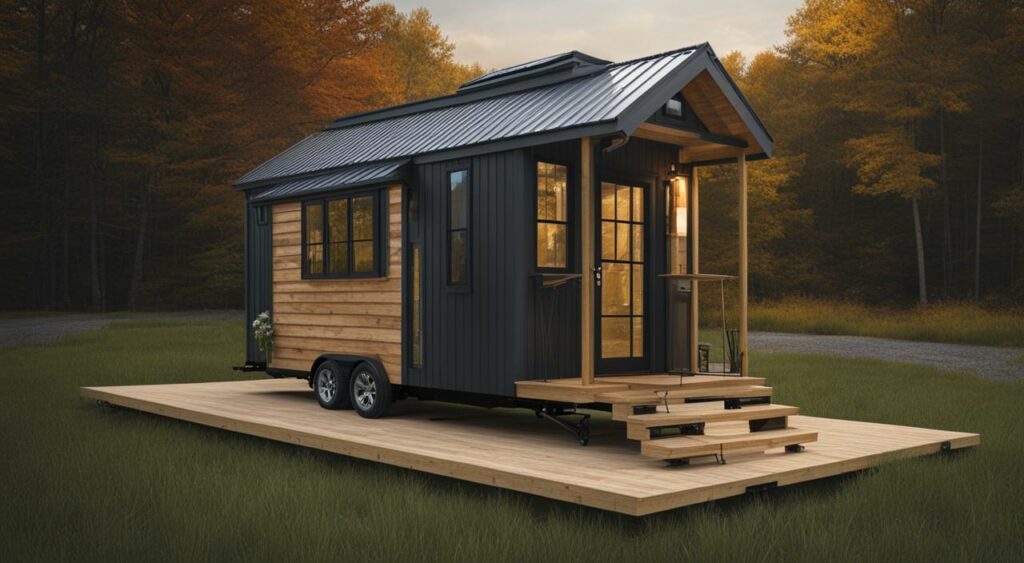
In New Hampshire, tiny houses have smaller square footage than traditional types of housing, making it crucial to understand the minimum dwelling size and floor requirements for these single-family dwelling units.
The International Building Code (IBC) version 2015, which many municipalities in the US have adopted, includes Appendix Q, which outlines minimum requirements for tiny houses on a foundation.
New Hampshire has adopted Appendix Q, which permits tiny houses that have a floor area of at least 220 square feet and a ceiling height of at least 6 feet and 8 inches.
There must also be at least one room with a minimum width of 7 feet and one habitable room, which must be a minimum of 120 square feet. Lofts can be included in the square footage, as long as they meet specific requirements.
However, New Hampshire’s RSA 674 empowers municipalities to regulate the use of land and structures within their borders.
This means that zoning ordinances and land use regulations on the local level may have more restrictive minimum floor requirements or square footage minimums for single-family dwelling units than the state’s minimum requirements.
For example, the town of Auburn’s zoning ordinance requires a minimum living space of at least 600 square feet for a new single-family dwelling unit, which is more than the state’s minimum requirement for a tiny house.
Town zoning boards are responsible for resolving disputes related to local zoning ordinances and granting zoning variances in New Hampshire.
It’s essential to check local zoning and building ordinances before building or placing a tiny house in a given location, as they may conflict with the state’s minimum requirements.
Table: Minimum Dwelling Size and Floor Requirements for Tiny Houses in New Hampshire
| Requirement | Minimum |
|---|---|
| Floor area | 220 square feet |
| Ceiling height | 6 feet 8 inches |
| Minimum habitable room width | 7 feet |
| Minimum habitable room area | 120 square feet |
Plumbing, Sanitation, and Water Supply Requirements for Tiny Houses in New Hampshire

When it comes to plumbing fixtures, sanitation sewer systems, and approved water supply sources, there are specific requirements that must be followed for tiny houses in New Hampshire.
According to the International Plumbing Code, tiny houses must have at least one toilet, one sink, and one shower or bath.
These fixtures must be connected to a public or private sewer system, or an approved on-site sewage disposal system.
For water supply, tiny houses must have a connection to a public or private water supply system or an approved on-site water supply system.
The water supply must be capable of providing hot and cold water to all fixtures.
In addition, the plumbing and electrical systems in a tiny house must comply with all applicable codes and standards, including those specific to New Hampshire.
To ensure compliance with these regulations, it is recommended that individuals consult with a licensed plumber and electrician before beginning construction on their tiny house.
It is recommended that individuals consult with a licensed plumber and electrician before beginning construction on their tiny house.”
Navigating Municipal and State Building Codes for Tiny Houses in New Hampshire

Building a tiny house in New Hampshire involves complying with both municipal and state building codes.
However, these codes often conflict with each other, making it difficult to navigate the legal requirements for tiny house living.
It is crucial to work closely with the building inspector in the area where you plan to build your tiny house.
The inspector can provide valuable information on the necessary permits, inspections, and occupancy requirements.
They can also identify potential conflicts between the municipal and state building codes and advise on the best way to resolve them.
Before starting construction, be sure to obtain all necessary permits and approvals. Failure to do so can result in costly fines and legal complications.
During the construction process, it is important to adhere to the code requirements for safety and structural integrity. This includes following regulations for the foundation, framing, roofing, and wiring of your tiny house.
Once construction is complete, the building inspector will conduct a final inspection to ensure that the tiny house complies with all relevant codes and regulations.
If there are any deficiencies, the inspector will issue a correction order, and the required modifications will need to be made before the occupancy can be granted.
“It is essential to work closely with the building inspector in the area where you plan to build your tiny house. The inspector can provide valuable information on the necessary permits, inspections, and occupancy requirements.”
Zoning Considerations for Tiny Houses in New Hampshire
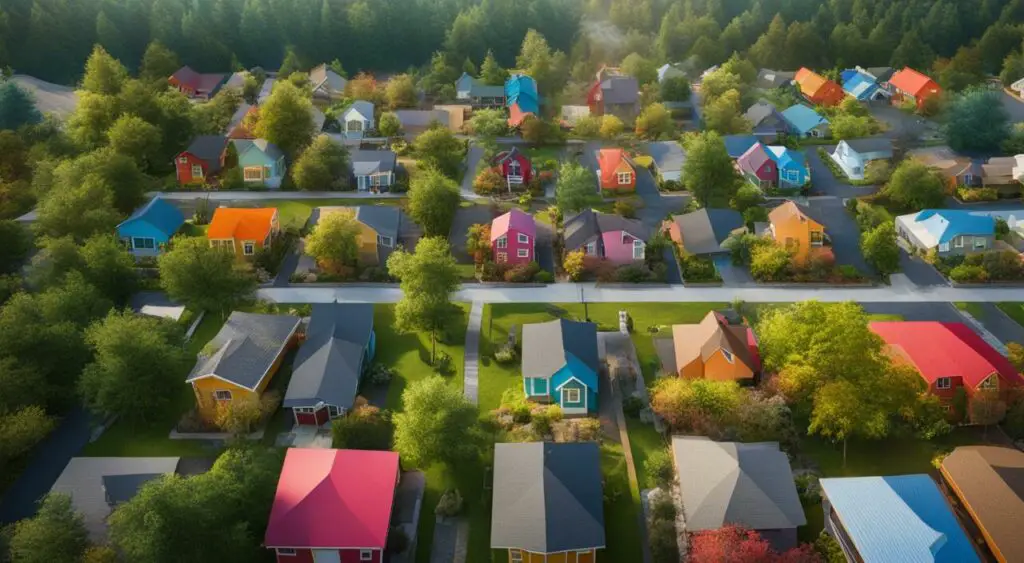
When it comes to zoning considerations for tiny houses in New Hampshire, there are several factors to keep in mind.
One of the most important is residential zoning laws, which dictate where you can legally park and live in a tiny house.
It’s essential to research and understand the specific zoning laws in the area you plan to reside in to remain compliant with local ordinances.
Land use regulations also play a significant role in determining whether or not you can live in a tiny house in a particular area.
Some towns may have additional stipulations, such as minimum lot sizes and required setbacks, which need to be considered before building or occupying a tiny house.
However, it’s worth noting that some towns are more welcoming to tiny houses than others.
Some may have local ordinances specifically tailored to tiny houses, while others may provide zoning variances that allow tiny houses to be placed in areas that would otherwise be prohibited.
Residential Zoning Laws
Residential zoning laws are perhaps the most critical factor to consider when it comes to tiny house living. These laws dictate where you can legally park and live in a tiny house in New Hampshire.
It’s crucial to research and understand the specific zoning laws in the area you plan to reside in to ensure compliance with local ordinances.
Many towns may have specific requirements for what qualifies as a dwelling unit.
For example, some towns may require a minimum square footage for houses or a minimum number of rooms. Other towns may require connection to specific utilities or certain types of foundation construction.
It’s important to familiarize yourself with these requirements to avoid being in violation of local ordinances and zoning laws.
Local Ordinances for Tiny Houses
Some towns in New Hampshire may have local ordinances specifically tailored to tiny houses. These ordinances provide rules and regulations for the construction, placement, and occupancy of tiny houses.
They may also have specific requirements for the size and type of tiny houses, as well as the location of utilities and wastewater systems.
It’s important to research the local ordinances in the area you plan to reside in to remain compliant with local regulations.
For example, a town may have specific requirements for the size and type of tiny houses, as well as the location of utilities and wastewater systems.
Failure to comply with these ordinances may result in fines, eviction, or other legal consequences.
Land Use Regulations
Land use regulations also play a crucial role in determining where you can legally live in a tiny house in New Hampshire.
These regulations may vary depending on the specific town or area you plan to reside in, and may include minimum lot sizes, required setbacks, and other stipulations.
Before building or occupying a tiny house, it’s essential to research and understand these regulations. Failure to comply with land use regulations may result in fines, eviction, or other legal consequences.
Zoning Variances
Some towns in New Hampshire may provide zoning variances that allow tiny houses to be placed in areas that would otherwise be prohibited.
These variances can be particularly useful in areas with strict zoning laws or land use regulations.
However, it’s important to note that obtaining a zoning variance can be a complex process that requires time, effort, and potentially legal representation.
It’s crucial to understand the specific requirements for obtaining a variance in your area, as well as the potential legal and financial consequences of non-compliance.
Financial and Legal Considerations for Tiny House Living in New Hampshire
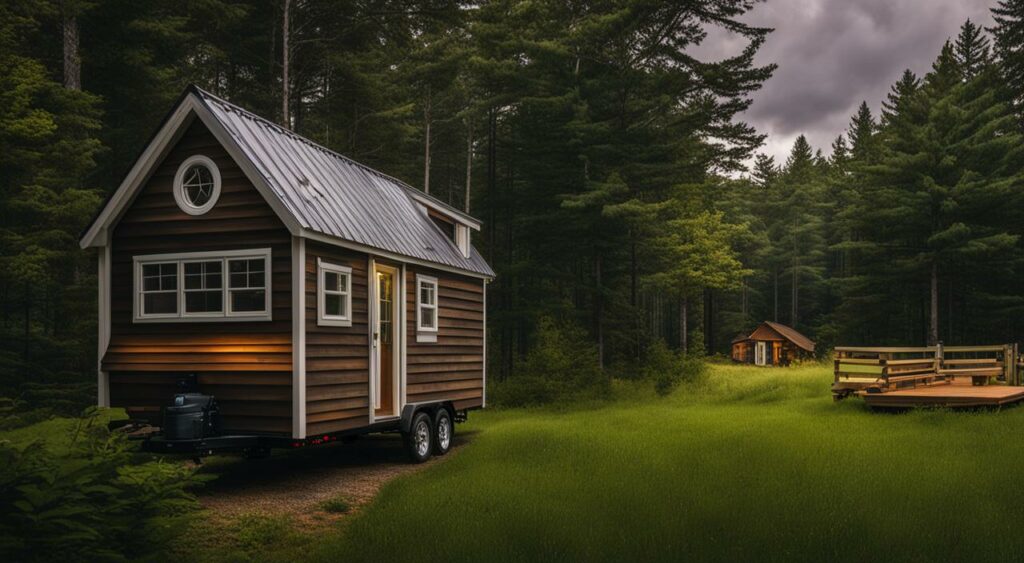
Living in a tiny house in New Hampshire comes with financial and legal considerations that individuals should keep in mind. Below are some of the key factors to consider:
Real Estate
When purchasing or renting a piece of land to park a tiny house in New Hampshire, it is important to consider real estate laws.
Individuals should ensure that the property is zoned for residential use and that they have the necessary permits and approvals to park their tiny house on the land.
Mortgage and Financing
Financing a tiny house can be challenging, as traditional lenders may not offer mortgages for homes under a certain square footage.
In some cases, individuals may need to consider alternative financing options such as personal loans or RV loans.
Insurance
Insurance for tiny houses may be more challenging to obtain than traditional homes.
Some insurance providers may offer coverage for tiny houses as RVs, while others may offer coverage under a homeowner’s insurance policy.
It is essential to shop around and find an insurance provider that offers coverage that meets the individual’s needs.
Property Taxes
Individuals who own a tiny house in New Hampshire may be subject to property taxes.
The amount of property tax owed will depend on the assessed value of the land and any improvements made to the property.
Legal Challenges
Living in a tiny house may present legal challenges that individuals should be aware of. For instance, parking a tiny house in a location that is not zoned for residential use may result in legal action from the local authorities.
It is important to consult with an attorney and research local zoning laws to avoid any legal challenges.
Advocacy Groups
There are several advocacy groups in New Hampshire that support tiny house enthusiasts.
These groups can provide guidance on legal matters, offer networking opportunities, and help connect individuals with resources such as tiny house builders, rentals, and communities.
Some of the notable advocacy groups in New Hampshire include the Tiny House New Hampshire Meetup Group and the Granite State Tiny House Association.
Note: It is important to consult with professionals in the real estate, finance, and legal industries when considering living in a tiny house in New Hampshire. This can help individuals navigate the complexities of tiny house living and ensure that they are in compliance with the relevant laws and regulations.
Embracing Green Living with Tiny Houses in New Hampshire
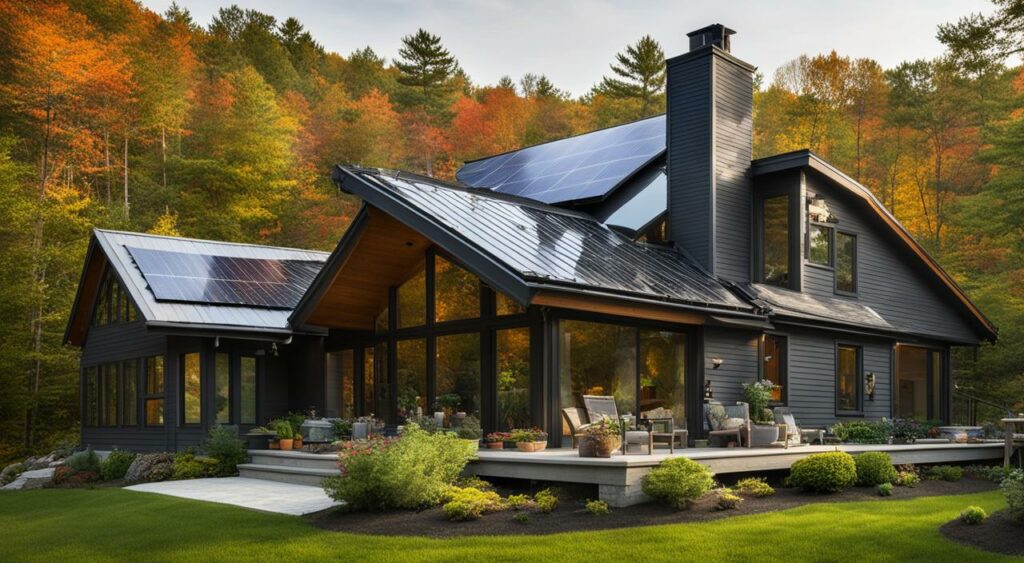
Tiny houses are not only a unique and creative way of living. They can also promote sustainable living and a reduced carbon footprint.
Tiny houses require fewer resources to build and maintain, and this makes them an eco-friendly alternative to traditional types of housing.
In New Hampshire, where energy costs can be high, tiny houses can also help to reduce energy consumption and lower utility bills.
One of the main advantages of tiny houses is their energy efficiency. Due to their smaller size, heating and cooling are more efficient and require less energy.
Many tiny houses are also designed to be off-grid, meaning that they generate their energy through renewable sources such as solar panels or wind turbines.
This reduces the dependency on non-renewable energy sources and minimizes the carbon footprint.
Tiny houses can also promote sustainable living, as they encourage a simplified lifestyle with less consumption.
They require fewer building materials, less energy for heating and cooling, and less space, contributing to a more sustainable and eco-friendly way of living.
Off-Grid Living with Tiny Houses in New Hampshire
Off-grid living is becoming increasingly popular in New Hampshire, and tiny houses are an ideal way to achieve this lifestyle.
Many tiny houses are equipped with solar panels, composting toilets, and rainwater collection systems, making them self-sufficient and reducing the reliance on public utilities.
Off-grid living with a tiny house can help to reduce the carbon footprint and minimize environmental impact.
Renewable Energy Sources for Tiny Houses in New Hampshire
New Hampshire is an ideal location for renewable energy sources such as solar power and wind energy. Tiny houses can take advantage of these resources and become self-sufficient in terms of energy generation.
Many tiny houses are equipped with solar panels that can generate electricity, and some homeowners even install wind turbines to power their homes.
The use of renewable energy sources in tiny houses not only promotes sustainable living but also reduces energy costs and minimizes the carbon footprint.
The Importance of Sustainable Living in Tiny Houses
Sustainable living is crucial in tiny houses, as they rely on limited resources and require a simplified lifestyle.
The focus on sustainability can help to promote an eco-friendly way of living and minimize the carbon footprint.
The use of renewable energy sources, such as solar panels and wind turbines, can contribute to sustainable living and reduce energy costs.
Composting toilets, rainwater collection systems, and other sustainable technologies can also be incorporated into tiny houses to promote eco-friendliness.
Exploring Tiny House Communities and Resources in New Hampshire
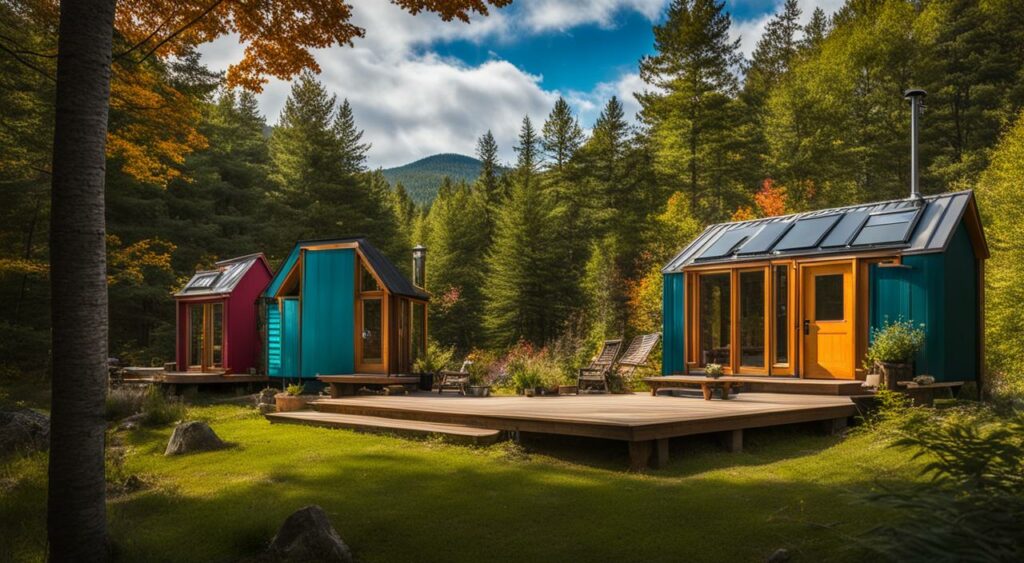
If you are looking for tiny house resources and communities in New Hampshire, there are plenty of options available.
The tiny house movement has gained popularity in the state in recent years, and many organizations and communities have formed to support tiny house enthusiasts.
Tiny House Associations
One of the most notable organizations in the tiny house community is the Tiny House Association.
The association provides resources and support for individuals interested in tiny house living, including information on building codes, zoning regulations, and advocacy efforts.
Tiny House Network
Another popular organization is the Tiny House Network, which connects tiny house enthusiasts and provides access to resources, including guides and educational materials.
Members can also connect with others in the community to share experiences and offer support.
Tiny House Festivals
For those interested in attending events and festivals dedicated to tiny houses, New Hampshire has several options available.
One such event is the New England Tiny House Festival, which takes place annually and features tiny house tours, workshops, and vendors. Other festivals include the Green Living Expo and the Green Building and Sustainable Design Conference.
Tiny House Builders and Rentals
If you are looking for a builder or rental company for your tiny house project, there are several options in New Hampshire. One such company is Granite State Tiny Homes, which specializes in custom-built tiny houses.
Tiny House Vacations offers several tiny house rentals throughout the state, allowing individuals to experience tiny house living without committing to a long-term project.
Tiny House Communities
Finally, for those looking to join a tiny house community in New Hampshire, there are several options available.
The Woods at Millbrook is a tiny house community located in Meredith, New Hampshire, with lots available for purchase.
The Village at Flat Rock is another tiny house community offering both rental and ownership options.
With so many resources and communities available, it’s clear that tiny house living is growing in popularity in New Hampshire.
Whether you’re interested in building your own tiny house or joining a like-minded community, there are plenty of options to explore.

Conclusion
This article has provided a comprehensive guide to understanding and navigating the laws and regulations related to tiny houses in New Hampshire.
By following these guidelines, individuals can pursue their dream of living in a tiny house while complying with the necessary legal requirements.
Recap of Key Points
The article began by emphasizing the importance of understanding the legalities and regulations associated with tiny house living in New Hampshire.
It then delved into the specific building laws and zoning regulations that apply to tiny houses, such as the International Building Code, Appendix Q, and relevant bills and amendments.
The minimum dwelling size and floor requirements for tiny houses in New Hampshire were also discussed, as well as the specific plumbing, sanitation, and water supply requirements that tiny houses must adhere to.
The article provided guidance on navigating the municipal and state building codes for tiny houses in New Hampshire, including how to obtain permits, inspections, and occupancy certificates.
It also explored the zoning considerations for tiny houses, and the financial and legal considerations associated with tiny house living.
The environmental benefits of tiny house living were highlighted, including energy efficiency, sustainability, off-grid living, the use of renewable energy sources, and a reduced carbon footprint.
Finally, the article provided information on various organizations, builders, rentals, and communities available to those interested in tiny house living in New Hampshire.
Final Thoughts
Living in a tiny house can be an exciting and rewarding experience, but it’s important to understand and comply with the legal requirements associated with it.
By following the guidelines outlined in this article, individuals can pursue their dream of tiny house living in New Hampshire while also ensuring safety and compliance.
Furthermore, it’s important to remember that the laws and regulations related to tiny houses in New Hampshire may change over time.
Therefore, it’s essential to stay informed and up-to-date on any changes that may affect tiny house living in the state.
Other related article
- Tiny House Laws Indiana: Unlocking the Secrets
- Tiny House Laws in Massachusetts: The Ins and Outs
- Tiny House Laws Colorado: A Friendly Guide
- Tiny House Laws in Florida: Everything You Need to Know
- Understanding Tiny House Laws in Virginia: A Quick Guide
- Tiny House Laws Wisconsin: Understanding The Law

Arc. Joseph Benson the CEO of Free tiny homes, Free Tiny Homes is a free, open-source, collaborative resource for anyone interested in building their own tiny home…


